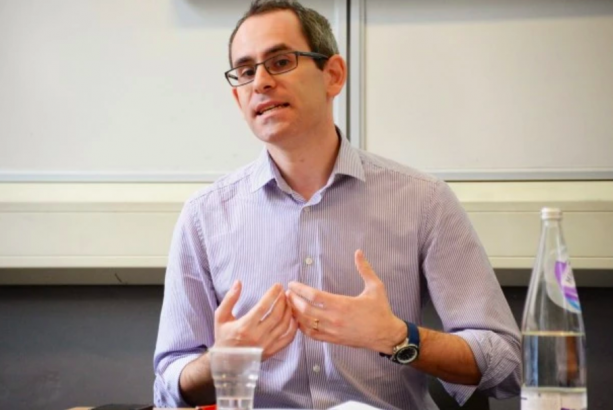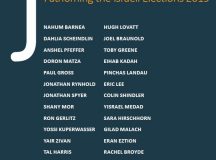During Benjamin Netanyahu’s first premiership in the late 1990s, his crisis-driven leadership style led British Ambassador David Manning to liken him to ‘a drunk who lurches from lamp post to lamp post’.
So adept has Netanyahu become in recent years at survival on the edge of the abyss, that he has frequently seemed master of his fate; truly ‘kosem’, gifted with magical powers, as his supporters would chant after each electoral survival.
But with the likelihood increasing of a coalition forming to remove him, we may come to see that Netanyahu was, at the end of his time in office, in fact just a drunk running out of lamp posts.
In each of four elections over two years, Netanyahu has failed to achieve a winning coalition. Of the 1.35m voters who backed him last year, he lost around 300,000, collapsing from 36 seats to 30 in a low turnout election. Had the Joint List (a coalition of small Arab parties) not also seen a collapse (caused by its split), the anti-Bibi bloc would have walked this election.
That Netanyahu’s Likud, in spite of this, emerged by far the largest party, is still remarkable given that Netanyahu’s trial for bribery, fraud, and breach of trust will resume within days. The Abraham Accords and successful vaccine procurement help explain Netanyahu’s enduring appeal. His capacity to cling to the keys of the Balfour Street residence even now should not be underestimated. As Netanyahu has shown over the last two years, to remain Prime Minister he need not form a government, merely prevent another being formed to replace him, even if it means yet another election.
But more than ever there is a mood of change. Aside from his own party, Netanyahu has committed support only from two ultra-Orthodox parties with 16 seats, and the far right ‘Religious Zionism’ list with six – 52 of the Knesset’s 120 seats in total.
To get a 61-seat majority, Netanyahu would need the support of two uncommitted parties, Naftali Bennett’s right-wing Yamina, and the Arab-Islamist Raam, led by Mansour Abbas. He doesn’t seem close to getting either, and leader of ‘Religious Zionism’, Betzalel Smotrich – whose list unites Israel’s most extreme right-wing parties – has made Netanyahu’s life harder by refusing to join a government backed by Raam.
Meanwhile, the constellation of seven anti-Netanyahu parties has 57 seats. To get to 61 this bloc would need only one of Yamina or Raam, giving it a clear advantage. Either way this would be an unlikely coalition of ideological opponents. But that is to jump ahead.
There is a crucial doorway from the election results to forming a government and its doorkeeper is the President Reuven Rivlin. In the coming days he will, as Israeli law dictates, consult with each party. He must then, according to law, ‘assign the task of forming a Government to a Knesset Member who has notified him that he is prepared to accept the task’.
To make Rivlin’s life easy the anti-Bibi bloc must coalesce around a candidate and ensure he has more support than Netanyahu. The obvious choice is Yair Lapid, whose Yesh Atid party, with 17 seats, is by the far the largest in the anti-Bibi camp. Lapid did the hard yards building an impressively resilient centre party, and ran a calculated and statesmanlike campaign. He has earned a shot at the prime minister’s chair.
He has the support of Lieberman’s Yisrael Beiteinu and its seven seats, most likely the left wing Labor (7) and Meretz (6), and will hope to win over his former ‘Blue and White’ running mate Benny Gantz (8), taking him to 45. The Joint List (of Arab parties) is avowedly anti-right and reckoned in Lapid’s column, taking him to 51. However, whilst Gideon Saar and his six ‘New Hope’ MKs are also committed to removing Netanyahu, they are not keen on a ‘centre-left’ government led by Lapid and reliant on Arab parties. Saar’s party of Likud defectors will not endorse Netanyahu, but they may stay silent, or try to build a camp around Naftali Bennett.
So Lapid may need Raam leader Mansour Abbas’s four endorsements to overtake Netanyahu when the President’s holds his consultations. The role Abbas is playing may be the most significant legacy of this election. He split from the other Arab parties to pursue a radical new strategy in Arab-Israeli politics, declaring he would support any camp, including Netanyahu’s, willing to address the needs of the Arab sector. This unexpected pragmatism has bamboozled Israel’s elites and transformed the coalition building equations. It has also given new legitimacy – both for Jewish and Arab publics – to Arab parties participating as full players in the coalition game. Abbas could have been the final trick up Netanyahu’s sleeve, but for the objections of the far-right ‘Religious Zionist’ list.
Therefore, only Naftali Bennett, who signed a pledge not to back Lapid as prime minister, can tip the scales back to Netanyahu’s camp in the President’s calculations. By refusing to commit to either pro or anti-Netanyahu camps in the campaign, he sought the kingmaker role. He perhaps imagined himself after the election like Aladdin in the cave of wonders, when the Genie (played by Benjamin Netanyahu) sings ‘You ain’t never had a friend like me,’ and offers to make his wishes come true. But since Bennett’s party can only get Netanyahu to 59, Bibi’s promises are of little value. Bennett’s demeanour since election night, when he declared cryptically, ‘What has been is not what will ’ and ‘I will do what is good for all citizens of Israel,’ implies he wants to be part of the change.
Bennett may not endorse Lapid, but so long as he does not endorse Netanyahu, Lapid is in pole position to win the nomination. But even then, that is not the end, merely the end of the beginning. For a party with only 17 seats to reconcile the conflicting demands of seven or more small parties in a coalition deal is a Herculean task.
The parties that nominate Lapid will not necessarily be the ones to serve in his government. He may be forced to rotate the premiership with coalition partners from the right. Netanyahu will try to thwart him by hunting for defectors. Meanwhile the anti-Netanyahu camp will try to seize control of the Knesset and neuter Netanyahu with legislation preventing an MK under indictment forming a government. The ultra-Orthodox parties always prefer to be in government, and may enter negotiations, and some will consider if a government can be formed with Likud, but without Netanyahu. Three-dimensional chess barely does it justice.
However, the core fact that should have Netanyahu worried is that the 57 Knesset members committed to his removal appear flexible and determined enough to win over the extra mandates necessary. What’s more, revulsion at the possibility of a fifth election, and shared national interests in passing a budget for a Covid-stricken economy, should be enough to enable an ideologically disparate band to cooperate, at least long enough to boot out Bibi and restore some stability.
All the parties understand that a PM under indictment removes the flexibility needed to build stable coalitions from a highly fragmented parliament. They know too that Netanyahu’s removal will open up the field for all of them. Should Netanyahu be shunted aside and left to face the judges without the aura of his office, who knows what flowers may bloom.
Two parties of the left, Labour and Meretz, written off by many, expanded their combined vote share from 7 to 13. The left will remain niche, but these parties’ leaders, Merav Michaeli and Nitzan Horowitz, emerge energised. Michaeli, who led Labour through the election with poise and style, should be able to avoid Labour’s usual routine of intra party bloodletting, and has a base to build from.
Meanwhile Centrist Benny Gantz, the ex-general who led the opposition before being suckered into power sharing with Netanyahu, has emerged from the ill-fated unity government scarred but standing. His eight seats was more than predicted. But whilst he restored some dignity, he still lacks a party base. So too Gideon Saar, whose breakaway from Likud finished with a disappointing six.
So one thing is for sure, the Israeli party system will mutate again before the next election. If Netanyahu is displaced, some of his estranged political children on the right– Bennett, Saar, Lieberman – may ultimately try to find their way home to Likud.
In the meantime, as Israel munches through the Passover holiday, the parties will jostle and haggle, as the nightly news programmes weigh every possible governing combination.
To get a broader perspective, Israeli viewers must turn to Israel’s leading political satire, Eretz Nehederet (‘A Wonderful Country’). In a skit that went viral after the election, Shauli, a regular Israeli, is interviewed at home with his wife Irena. He opines that after repeated failed elections, voting is futile. Sadly, he tells the interviewer, dead-pan, the only solution is civil war, including all Israelis (‘except the Arabs – we fought you enough and it got us nowhere’). ‘Every day we aren’t killing each other’ he says to camera, ‘is a waste of time’.
It’s an instant classic. Darkly funny, brilliantly acted. But the message is clear. However messy Israeli democracy is, it is better than any alternative route to political change. This time, it may just deliver.




































